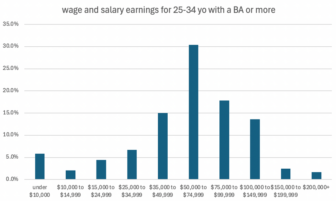Talk about swimming upstream. That is what the Saginaw News has done in a terrific editorial where they argue the state needs to raise taxes to support higher education. The editorial is entitled: More college graduates would help Michigan grow, prosper. It is a must read.
The editorial makes the case that: … Without an educated population, our state will never have the resilience or enjoy the kind of economic growth other states have. And that’s regardless of Gov. Snyder’s proposed elimination of the business tax and other measures intended to make Michigan more attractive to employers. The editorial goes on to advocate for a tax increase (using either the income or sales tax) to make college education more affordable, if not free.
They are exactly right. Michigan’s fundamental economic problem is that we are now 36th in the proportion of adults with a four year degree and 37th in per capita income. There is little prospect that we will get more prosperous compared to the country as long as we are in the mid 30s in college attainment. Of the 15 states with the highest proportion of adults with a four year degree, 13 are also in the top 15 in per capita income. The two are inextricably linked and will become even more so in an increasingly knowledge-based economy.
Over the past decade on a bi partisan basis and now under three Governors higher education funding has been on the chopping block. It makes no sense. When college attainment didn’t matter so much to economic success in the 20th Century Michigan built arguably one of the great systems of colleges and universities on the planet. Now when it may well be what matters most to economic success we have spent a decade and our continuing to disinvest in that system. Really bad policy!
The sooner we learn the lesson that the Saginaw News has learned: that investing in higher education, even if it means raising taxes, is essential to growing the Michigan economy, the better off we will all be.






